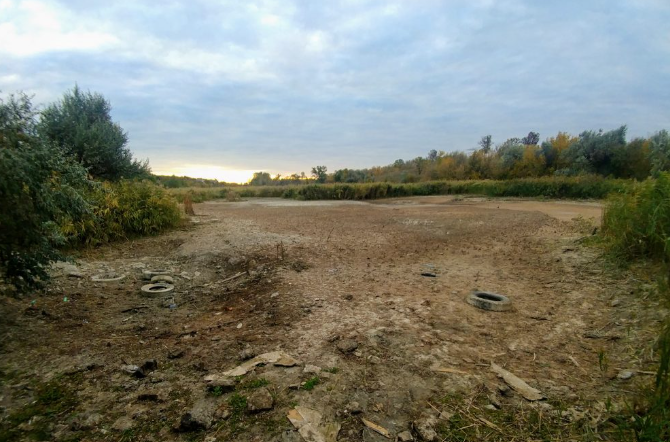Zaporizhzhia region is among Ukrainian regions with scarce water resources. Rivers Dnipro and Berda, Kakhovka and Dnipro reservoirs and Kakhovka main water channel are key sources of water for local residents.
As an outcome of the Russian destruction of Kakhovka Hydro Power Station, the supply of water to the south of Zaporizhzhia region has been destroyed. Residents of some occupied communities experience the shortage of drinking water. The most critical situation is observed in southern communities of Melitopol and Berdyansk raions.
The Center for Journalist Investigations examined whether southern raions of Zaporizhzhia region will survive without supply of water from Dnipro.
According to information of the Zaporizhzhia Oblast Military Administration, 96% of water needs of residents and enterprises have been satisfied by the water from Dnipro river, before the destruction of the Kakhovka Hydro Power Station. Dnipro has been main source of drinking water for cities of Zaporizhzhia, Berdyansk, Vilnyansk as well as settlements of Vilnyansk, Zaporizhzhia and Novomykolaivka raions and some settlements in southern raions of Zaporizhzhia region. Approximately 90% of Zaporizhzhia region suffer from the scarcity of water resources. The density of river network there is lower than in steppe regions of Crimea.
After the destruction of Kakhovka station, Russian «governor» of temporary occupied Zaporizhzhia region Yevhen Balytsky declared that water supply would be secured by the network of wells and water channels. Russian occupants plan to restore them or build new ones on the temporary occupied territory.
The most explored reserves of groundwater are located in Melitopol and Kamyansk-Dniprovsky raions.
Valery Sanko, ex-Deputy Director of Pryazovsky National Natural Reserve, explains whether the supply of water only from wells will satisfy the demand:
«Melitopol raion is lucky. With exception of its southern communities, the raion receives water from Buchatsky aquifer. It is 300 meters deep. Buchatsky aquifer is isolated, its water has good quality, its chemical and biological profile meets sanitary and hygienic requirements.
There is the following question: do Russian occupants have resources (and good will) to build wells reaching Buchatsky aquifer? Or will they construct water channels from existing wells? It is likely that their new wells will reach only Sarmatian aquifer (approximately 100 meters deep). Water from this aquifer is not good for drinking». The scholar also draws attention to possible exhaustion of groundwater.
Buchatsky aquifer has large reserves of good quality water. However, the level of water has already fallen by 86-90 meters during thirty years of its exploitation. This aquifer supplied water to settlements of the region as well as to Zaporizhzhia iron ore plant. After 1995 the intensity of its use reduced and level of water stabilized.
«Exhaustion of underground water negatively impacts the environment of the region. The outcomes will be irreversible. Excessive use will also negatively impact surface water. As a result, there will be less water in rivers whereas agricultural lands will lose their water supply. The vegetation cover will change. Excessive use will lead to salinization of aquifers», as tells Sanko.
The CJI surveyed heads of communities in the most arid part of Zaporizhzhia region about perspectives of water supply.
Andrii Solopov, the Head of Pryazovske village council, reported that, after the destruction of Kakhovka dam and system of supply of Dnipro water, only part of settlements of Pryazovske raion has enough drinking water.
Villages Botievo, Babanivka, Novoivanivka and Dobrivka have their own water sources whereas Pryazovske suffers from the shortage of drinking water. The community has been connected to so-called Berdyansk water channel in 2006, in order to secure water supply during spring and summer.
«Two artesian wells are now working in Pryazovske. They were built under Soviet Union. They are more than 100 meters deep. The village has also its own natural source of drinking water. However, it is far from being enough», as says head of the community.
As Andrii Solopov explains, some residents have their own so-called technical wells. But it is not drinking water whereas the use of this water for irrigation will saltify the land.
Oleksandr Pravosud, the Head of Yakymivka Military Village Administration of Melitopol raion, says that if Russian occupants will construct additional water wells, the quality of the water will be low along a number of indicators. The share of sulfates and chlorides will increase by several times, water hardness and dry residue will worsen by 2-3 times.
«The water from local wells makes our land unsuitable for gardening. Many residents are involved into the gardening. This water disables equipment (laundry machines etc.) and many people suffer from urinary stone diseases etc. So, we improved the quality of water in Yakymivka by refusing from water wells and switching to Dnipro water. It did make sense», as says Pravosud.
The situation in Berdyansk is different.
Viktoria Galitsina, the Head of Berdyansk Military City Administration, reported that Dnipro water has not been used by Berdyansk residents for many years.
«The city has used water from Berda water reservoir for many years. It does not meet sanitary requirements, it has unpleasant flavor but it satisfies fully the demand of the city. As experts say, this reservoir will be sufficient for many years ahead», as reported Galitsina.
In accordance with the analysis of water supply, conducted by Zaporizhzhia Oblast State Administration, physical and chemical characteristics of approximately 79% of underground water in Zaporizhzhia region do not meet requirements of the State Sanitary Norms and Rules (the share of manganese, iron; hardness).
The majority of settlements of currently occupied Berdyansk, Vasylivka, Melitopol and Polohy raions use drinking water, not meeting hygienic requirements and sanitary and chemical indicators (iron, manganese, mineralization).
It is possible to secure the water supply only from wells. However, their construction requires scientific studies, resources and time, as reported heads of communities. They hope that Russian occupants will not have the time to do it as raions will be liberated from the Russian occupation. After liberation, heads of communities are ready to solve the issue of water supply by involving international experts and resources.











